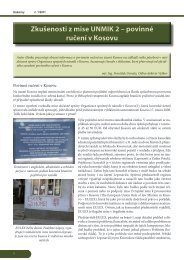TRADOC Pam 525-3-7-01 - TRADOC - U.S. Army
TRADOC Pam 525-3-7-01 - TRADOC - U.S. Army
TRADOC Pam 525-3-7-01 - TRADOC - U.S. Army
- No tags were found...
You also want an ePaper? Increase the reach of your titles
YUMPU automatically turns print PDFs into web optimized ePapers that Google loves.
<strong>TRADOC</strong> <strong>Pam</strong> <strong>525</strong>-3-7-<strong>01</strong>Regardless of which department or agency has the lead in future operations, the military willhave a significant role. For this reason <strong>Army</strong> leaders must learn the capabilities, expectations andworld view of executive department civilian employees from outside the DOD to insure thatunity of effort results even where unity of command may not exist. This requires an acceptanceof the priority of task over ego; negotiation over direction; and a willingness to capitalize onskills, such as detailed planning, which military professionals possess. Leaders who expect andaccept cultural difference as an opportunity will prosper in such collaboration.Future operations are still going to involve large numbers of contract personnel performingsupport functions. The <strong>Army</strong> relies on dedicated contract personnel; yet, institutionally theServices, the Congress, and the Nation must come to terms with where contractors fit within thejoint team, particularly during conflicts. Contractors can be perceived as outsiders whose firstobligation is to their company, but the fact is that their first obligation is to the client—often the<strong>Army</strong>. They may lack formal status and authority. Contractors may have a different rewardsystem from the uniformed members who depend on their skills. As more and more positionsand functions are outsourced, <strong>Army</strong> civilians can see contractors as a threat to their continuedprofessional career status. Often contractors supporting the military come from a militarybackground, thus sharing some of the culture and values of their serving brethren. In the futurefinding ways to assimilate contractors whether in combat or normal operations will pay greatdividends.Culture of Allies and Co-belligerentsIn his 1952 Kermit Roosevelt Lecture at the U.S. <strong>Army</strong> Command and General Staff College,Field Marshall Sir William Slim observed the only thing worse than having allies, was not havingallies. Alliances can be formal as they were in World Wars I and II. Alternatively, they can beinformal as in Desert Storm, Operation Enduring Freedom (OEF), and OIF. Whatever the form,allies come with their own values, traditions, capabilities, limitations, and often requirements.They can incorporate into the scheme of operations or not. Still Slim’s point remains valid. Theonly thing worse than having them there, is being alone, without them.Smooth integration of allied units and individuals requires not only good will on both sides,but also a lot of preplanning. Operationally the rule is generally to design a role for allies orcoalition partners consistent with their capabilities, commitment, and political constraints.Making formal or informal alliances work requires the ability to understand allies’ view pointswell enough to understand how the mission looks from their eyes. <strong>Army</strong> leaders must realize thatallies’ commitment may be less than our own, that they are undoubtedly organized differently,think differently about how command functions, receive authority and operate under a differentcode of law, and behave differently.Allies’ presence and participation in a coalition is a matter negotiated at the highest politicallevels. Often the strategic value of their participation will be enough to offset a lack of militarycapability. Cultural awareness and sensitivity to nuance and difference is essential. Normallyexchanging liaison officers will continue to be essential to a healthy working relationship tobridge cultural differences or at least to make differences known in advance before they becomeoperationally significant. As the <strong>Army</strong> transforms it is likely that potential future partners will74



